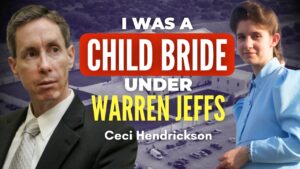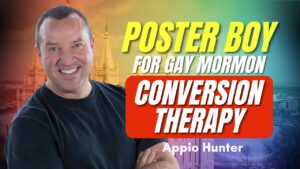After being inspired by the Mormon Stories Paul brothers episode, Dave courageously shares his powerful journey through faith, family struggles, and self-discovery. From his upbringing in a traditional Mormon household to navigating complex questions about church history, LGBTQ+ issues, and personal loss, Dave’s story is one of resilience and hope. He reflects on his brother’s tragic passing, his evolving beliefs, and why he ultimately chooses to stay active in the church today. Tune in for a heartfelt conversation about faith, doubt, and finding meaning through it all.




2 Responses
One of the most frustrating Mormon Stories I have ever listened to. Yet another, usually Utah born and bred Mormon, who discovers the truth about the Mormon story but because he/she lives in Utah, it’s all he/she has ever know, his/her social relationships, family relationships would all be devastated if they left, it could also end their marriage he/she decides to stay and then justifies it and defends Mormonism. I just don’t get it. This is an organization built on lies and deception. This is an organization that continues to lie and deceive, that continues to end marriages, harm family relationships, ruin individuals self esteem and self worth, that shames members into giving it money they can’t really afford and gives claims of false blessings in return. I could go on and on about the harm Mormonism does. Why does it do that harm? Because it was built on lies from the start, it teaches doctrines that are not true, it is a shame based culture that destroys and puts the power over individuals in a handful of men that claim to speak for God when that IS NOT TRUE. Why people who don’t even believe, who know Mormonism’s claims are false continue to defend it is beyond me. Let’s be honest about Dave and individuals like him, and yes this is my opinion, most of them would leave the Church fully if they didn’t fear the social consequences. If they weren’t afraid of life without Mormon control. This isn’t about whether the Church is true or not. It isn’t. I’ve seen so many former Mormons and current Mormons whose lives have been devastated by what this Church teaches. If a charitable organization was found to be lying and deceiving its donors on any level despite also doing good things that organziation would be done for. Why is Mormonism any different?
This episode contains the most intellectually refreshing discussion I’ve ever heard on Mormon Stories. And that’s saying a lot, because I have listened to Mormon Stories off and on since 2014.
The most exhilarating part of Dave’s story is his friendly skepticism of what I call the false dilemma of belief in the Church. I’ve noticed that many Mormon Stories episodes contain the same troublesome phrase: “whether the Church is what it claims to be.” This forces most people to take sides in a true-or-false feud with microscopic attention to tangential details and Boolean logic. Dave’s comments reveal an understanding that things aren’t always so binary and that “what it claims to be” is only a crude approximation of what’s really going on.
Perhaps more people will apply Occam’s Razor as John and Dave mentioned in this episode. That razor can shave away a lot of unnecessary beliefs about Joseph Smith and the origin of the Church. If, like most people, you believe that Joseph Smith was not a con man, then the simplest explanation is that Joseph Smith, for reasons we may never know, started to believe that God was leading him somewhere, but that he sometimes interpreted his own imagination as dictation from God. We see this even today when novel ideas sometimes pop into people’s heads and are automatically honored as divine inspiration.
But, as Dave explains, many people transform this possible explanation into a binary decision. To adapt a Yogi Berra saying, if you come to a fork in the road about the truth of the Church, take it! In fact, Dave’s comments tempt me to believe that the fork itself is a delusion. Asking whether the Church is true is like asking whether a Beethoven symphony is true. Just as Beethoven’s music is an inspired human opinion about the nature of beauty, so is the Book of Mormon an inspired human opinion about the nature of God. Religion is not a list of propositions to be categorized as true or false before spiritual growth can proceed. Religion could be a fusion of art and morality, a place where sacred scriptures are merely the carrier wave of deeper truths about the existence of sin, the power of repentance, the miracle of forgiveness, and (to use one of Dave’s favorites expressions) a rationally ordered universe. And we can judge the truth of scriptures by how they transform us into the image of God, not by whether their stories are literally true. Remember, the greatest story ever told about the nature of God (Jesus’ story of the Prodigal Son) was a parable, not a historical event.
Thank you for a splendid episode. It prodded me to make another donation to Mormon Stories. By the way, I converted to the Church of Jesus Christ of Latter-day Saints in 1996, stopped attending after two months, and formally resigned my membership in 2016 after twenty years of spiritual limbo. If I had heard Dave’s story ten years ago, I think I might still be a member. I really do suspect that Dave’s worldview is similar to what many Church authorities quietly believe today, or what they inevitably will start believing if they think harder.